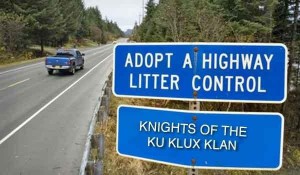Adopting a Highway: A Lawsuit between the KKK and Georgia
We usually take for granted the organizations and volunteer groups that keep our highways clean. We only notice who maintains a highway by the sign posted on the mile long stretch that a company adopts. As we drive past, we nod a slight acknowledgment to those groups that spend their Saturdays removing the trash from the side of the road.
The Georgia Supreme Court is currently deciding whether the local KKK chapter can adopt a highway. The Georgia Department of Transportation administers the state’s Adopt-A-Highway program. Any “civic-minded organization, business, individual, family or… [government] agency” can apply. For participating in the program, the department would erect “a sign with the Adopt-A-Highway logo” and the group’s name.
In May 2012, members of the International Keystone Knights of the Ku Klux Klan applied to participate in the Adopt-A-Highway program. In June, the Department denied their application, citing their “long-rooted history of civil disturbance… and potential for social unrest.”
The KKK, with the assistance of the ACLU, sued the State for violating their Constitutional rights to free expression and demanded a permanent injunction to stop the state from denying their application. The KKK also requested a declaratory judgment declaring that Georgia State was wrong to deny their application. The state filed a motion seeking the court to dismiss the lawsuit because of state sovereign immunity.
Freedom of Speech and the KKK
The First Amendment of the Constitution provides that the government may not prohibit or limit an individual’s right to free expression. Most speech is protected under the First Amendment, but there are some limitations. A speaker’s rights to speech and assembly can vary depending on the type of forum in which the speech takes place.
According to the Supreme Court, there are three types of forums: traditional public forums, designated forums, and nonpublic forums. Private property and some government property are not considered a forum for speech and don’t have constitutional protections for speech. 
Traditional public forums include sidewalks, parks, and other areas that are traditionally considered forums for public speech. Speech in these areas have the most protection from government involvement. The government cannot discriminate against a speaker based on their views.
Designated forums are areas that the government opens to the public, even though they are not traditionally intended as a public form. The government doesn’t have to keep these forums open once they open them. As long as the forum is open for public speech, it is afforded the same protections as a traditional public forum.
Nonpublic forums are not designated for speech nor are they traditionally public forums. The government can restrict speech as long as their restriction is reasonable. However, the government still can’t discriminate against a speaker’s viewpoint.
Georgia may argue that the Adopt-A-Highway program and the signs that they place along the highway is not a forum for speech. Since the state’s name is associated with the sign and the program, the government might argue that they don’t want to be affiliated with or condone the viewpoints of the KKK, and that a sign with Adopt-A-Highway may imply that Georgia does.
The KKK could argue that the signs and the program are a forum for speech, albeit not necessarily a traditional one. If this is the case, then Georgia cannot prohibit the sign since it would be considered viewpoint discrimination and a violation of the First Amendment.
Georgia’s Sovereign Immunity
In general, sovereign immunity protects the federal and state governments from lawsuits, usually for money damages. Governments were very concerned that if citizens had the ability to sue governments for money damages, they could potentially lose all the money in their treasuries to these lawsuits. The Eleventh Amendment of the Constitution protects states from these kinds of lawsuits.
A state or federal government can waive this immunity, and lawsuits brought against individual governmental actors are also not protected by sovereign immunity. Most parties that sue a state will usually sue someone like the governor, who represents the state. States will usually indemnify that state actor and provide them legal assistance for the lawsuit.
In the case of Georgia and the KKK, the KKK actually sued the state of Georgia rather than a state actor. This is currently one of the KKK’s major roadblocks in their lawsuit.
Should the KKK Be Able to Adopt-A-Highway?
Bottom line, we all know that the KKK is not simply interested in keeping the highways clean. The KKK in several states have challenged the ability for governmental programs to censor their speech and publicity. However, there is something to be said about allowing the KKK to adopt a highway.
If the government wins this dispute, it may give states more power to censor the speech of other organizations that it happens to disagree with ideologically. Viewpoint protection is one of the most important Constitutional protections. If the government were able to prohibit a particular viewpoint, they could basically eliminate all viewpoints that disagree with them.
However, it is understandable why Georgia wants to censor the KKK. As a state, Georgia has a very volatile history concerning minority rights and white supremacy. Only since 2001 has Georgia’s state flag changed from a modification of the confederate flag, which remains a symbol for white supremacy. Having a highway adopted and advertised by the KKK would be a step backward for them.
Can Georgia find a way to settle this issue without lessening the protections of the First Amendment? This is probably why the courts are more than happy to side with Georgia’s sovereign immunity argument. This is one of the only ways the Georgia courts can skirt the issue of government censorship without succumbing to the demands of the KKK.

Comments